A-Bit-Like-Sport; The ? Of ?; Why everything's the same; Premier League vs Self hating globalists; A lefty's dilemma; Tag's London Cliche; #5UP; The Leonsis lever; Lexicon; 10% off SportAccord
Overthinking the sports business, for money
UP Exclusive - Get 10% off SportAccord tickets
This newsletter is sponsored by SportAccord World Sport and Business Summit, which is taking place in the UK this year at Birmingham’s ICC.
From 7 to 11 April global leaders and senior execs from over 125 International Sport Federations, the IOC, rights holders, professional leagues, host cities and major event organising committees from all continents will be meeting to make decisions that will shape the future of sport.
With a thought-provoking conference programme, busy exhibition and a host of networking events, evening receptions and cultural activities SportAccord is your chance to organise a year’s worth of meetings in a week with executives from across the global sport ecosystem.
With senior execs from FIBA to FORTNITE, from FIA to Kansas City Chiefs don’t miss the chance to rub shoulders with the worlds sports and business leaders.
SportAccord are offering Unofficial Partner community a discount of 10%. Just click on the link to get your UP 10% discount
#5UP
We’re celebrating five years since we launched the Unofficial Partner podcast.
That's a good excuse for a party to which you're very welcome to join.
Catch up with old sports industry mates and make some new ones, in a private upstairs room at Mayfair's best pub.
Cheap gossip, expensive post code.
Places are very limited and available on a first-come, first-served basis.
So get in quick.
Why can’t I just learn to love the football regulator?
Britain has become a nation of self hating globalists, at war with everything it’s good at.
This is Janan Ganesh’s conclusion (itself a build on this piece in The Economist)
The “EPL” is the most successful British creation of my lifetime. And so the country has decided to honour it in characteristic fashion. We are going to regulate it.
Foreign kids in Foden shirts.
A soft power super hero; the envy of the world.
So why regulate?
The football regulator is an idea I should be in favour of, but I’m not.
And it niggles at me as to why.
Trains, water, energy….I’m there in a heartbeat.
Not just regulation - which almost always fails to regulate - but full fat re-nationalisation.
Important strategic national assets under central public ownership.
Football? Nope.
See previous, my lefty priors (What’s the point of British Cycling?).
That’s a long way of saying, I’m there in sentiment, but I don’t think the regulator will work in the way its advocates hope it will.
Like Brexit, the people who want the football regulator, really want it.
They wake up thinking about it.
Most of us can’t keep up that level of enthusiasm for the fight, which is the centrist dilemma.
Talking with football fan groups reminds me of being in a trades union.
I’ve been a member of two unions in my life (NUT and NUJ) and both times I've been surprised at how uncomfortable it felt.
I think it’s because the head is always way more radical than the body.
So - my reading of the public debate - is that the leadership of the fan groups are more bullish on the regulator than the majority of football fans.
And they’re encouraged to be by a media seeking conflict.
People are angry. Rightly. Look around, there’s a LOT to be angry about.
Some of that anger is about football.
Who doesn’t worry about another Bury, or hate Todd Boehly and the Glazers, or at least the idea of them, the worldview they represent.
But that doesn’t make the football regulator the right answer.
Build: The Premier League is a British sports washing masterpiece.
Brand Britain is made up of tangibles and intangibles.
Money and weapons are tangibles, and we’re still very good at both - the UK arms sales industry and the City continue to thrive.
The intangibles - Football, the NHS, the Royal Family and the BBC - are faring less well.
A planner would call it what it is: shit brand strategy.
Sport v A-Bit-Like-Sport
The key skill required of the next generation of sports fans is the ability to discern the difference between sport and things that are not sport.
Sport and a category we might call A-Bit-Like-Sport (ABLS).
WWE is the ultimate ABLS.
It’s not sport but looks like sport.
It has all the accoutrements - full arenas, pumped athletes, tribal crowds, a glossy media product.
But we all know it’s not sport.
Think of this as a continuum.
WWE at one end, Olympic wrestling medals at the other.
Much of what passes for sports marketing thought leadership boils down to pushing every sport towards the ABLS end of the spectrum.
It starts away from the field of play, in the commercial and marketing departments.
This is safe territory.
Match day experiences, media presentation. Who really cares?
Emboldened, the ABLS impulse creeps in to the arena.
An MLB time clock here. An F1 Sprint Race there.
Things that were once sacrosanct become acceptable.
It’s analogous with the Overton Window, beloved of political geeks.
It describes the spectrum of policies that are deemed politically palatable at any one time, framing the mainstream of ideas. If you’re outside the window, you’ll be viewed as a fringe zealot.
And again, in a diagram.
Over time, the window can be shifted to render even the most wacky outliers plausible to the general voter. Here’s John Lanchester in the LRB:
An idea can start far outside the political mainstream – flat taxes, abolish the IRS, more guns in schools, building a beautiful wall and making Mexico pay – but once it has been stated and argued for, framed and restated, it becomes thinkable. It crosses over from the fringe of right-wing think-tankery to journalistic fellow-travellers; then it crosses over to the fringe of electoral politics; then it becomes a thing people start seriously advocating as a possible policy. The window has moved, and rough beasts come slouching through it to be born.
Usually the shift takes years of relentless lobbying and media management. But occasionally, every generation or so, a crisis brings the opportunity to move Overton’s Window with greater speed.
That’s where sport is today.
Why?
I suspect for all the sports marketing industry’s back slapping bravado, the A-Bit-Like-Sport impulse reveals a deep lack of confidence in the product.
The ? Of ?
(Why everything’s the same)
Another problem of the A-Bit-Like-Sport movement is differentiation.
Sport By McKinsey is my phrase for what happens when sport is modelled.
The T20 of Rugby
The IPL of Women’s Football
The Drive to Survive of Tennis
Etc.
A feature of today’s sport marketplace is that everything is moving to the centre.
A bit of this, a bit of that.
A template for success.
A roadmap.
Each seeking to connect to the same affluent, global fan.
A consultant’s dream.
Beware The Wind Tunnel Effect
Sports used to be different to each other.
They appealed to different people.
They were played by different people.
This is not nostalgic romanticism.
There are structural reasons for this shift to the middle.
It’s what’s happening to literally EVERYTHING.
This is why your car looks like my car, the inside of your house looks like the inside of my house, your corporate brand logo looks like my corporate brand logo.
The wind tunnel effect is one reason cars are all the same.
Another is the sharing of ‘platforms’ between manufacturers.
This is efficient but boring.
Boring is the one thing sport can’t afford to be.
Cliche Corner - Tag Heuer’s Tower Bridge stunt
Client: ‘Think overpriced watches, skateboarding and London’.
Agency: ‘Sky Brown in front of Tower Bridge?’
Client: ‘Brilliant. Has that ever been done before?’
Agency: ‘Absolutely no way. Never’.
See previous:
Ted’s leverage is Jim’s dream
Sometimes, people - usually American people - call Man Utd and other big European clubs ‘a franchise’.
It’s meant as a compliment; it suggests enduring commercial value.
But it’s critical a football club NEVER actually becomes a franchise.
The reason is Ted Leonsis.
Like me, you’ll have been following the story of the Washington Wizards this past week.
It’s a case study in leverage and state capture.
Leonsis owns the Wizards. He shook hands on a deal to move them to Virginia. The state politicians U-turned. Leonsis went back to Washington.
Key bit: For $500MILLION….
Washington tax payers are funding billionaire Leonsis’ franchise to the tune of half a billion.
That’s the difference between a club and a franchise.
One is rooted in its location. The other just happens to be there. It’s a bargaining chip.
The owner can move, or threaten to move, if the local government don’t cough.
Jim Ratcliffe would love that sort of leverage.
From that AP piece highlighted above, a good quote from Greg LeRoy, executive director of incentives watchdog Good Jobs First, a Virginia organisation opposed to the deal.
‘It’s laughable to think that turning away a sports team seeking public financing will hurt the state’s business climate’.
Sportsbiz Lexicon
An UP guide to words and phrases not to be trusted.
Soup to Nuts
Suggests definitiveness. As in, ‘we can do the whole thing, soup to nuts’.
See also, turnkey solution. What links these two phrases is that they are always revealed to be absolute bollocks.
Just circling back
You didn’t respond to my AI generated email, so I’m sending you another one.
Fuck off.
Finally….Press the Like button at the bottom.


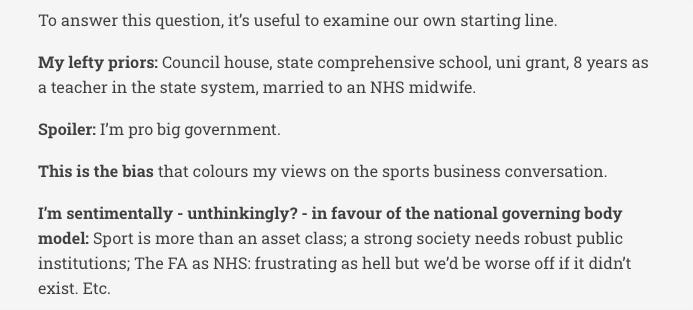
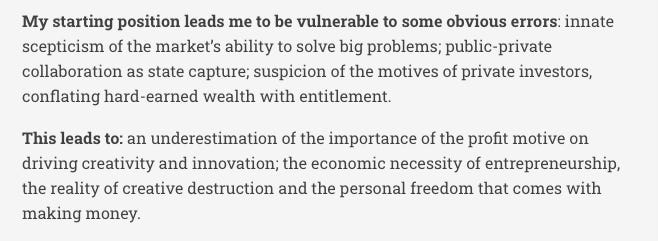
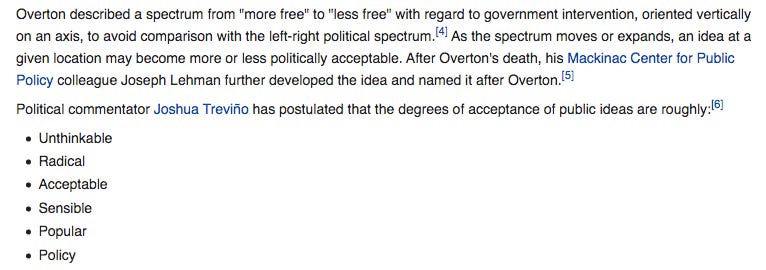


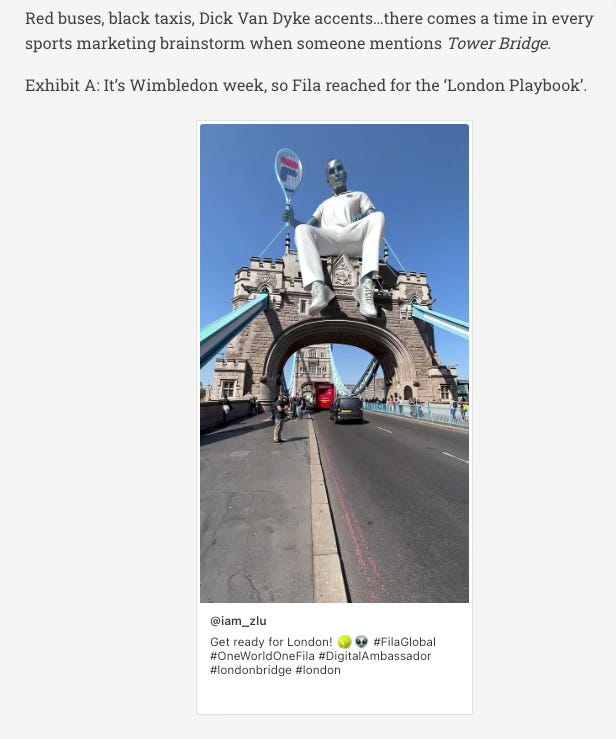
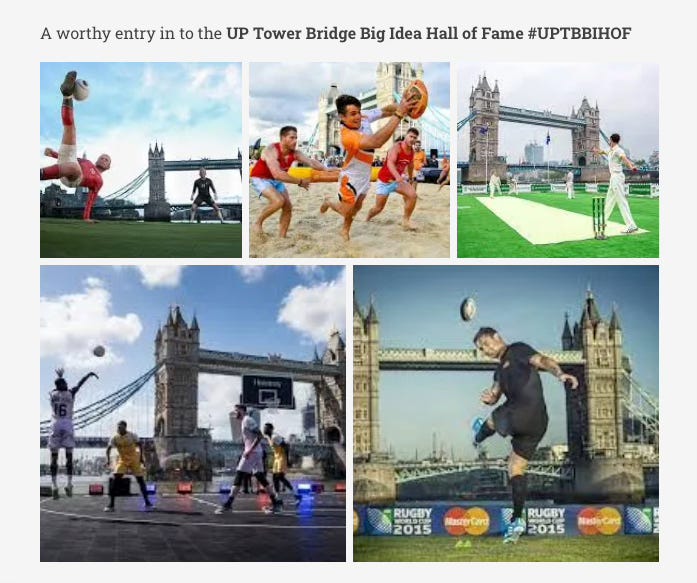

Great read… now settling down to go through all the links included 😀